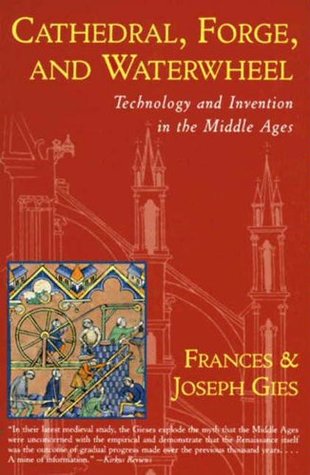Adventures in Bookland: Cathedral, Forge and Waterwheel by Frances & Joseph Gies

The received wisdom, derived largely from Renaissance propagandists and their amplifiers during the Enlightenment, was that Europe, after the end of the Western Roman Empire, entered a period of savagery and civilisational decline arrested only by the Renaissance that enabled Europe to cast off the superstitious shackles of the Church and emerge into a new world.
The truth is almost exactly the opposite. In fact, the period labelled the ‘Dark Ages’ saw some of the most profound and enduring developments in culture and civilisation since the Agricultural Revolution enabled the first sedentary civilisations. The ‘Dark Ages’ saw the end of slavery, the development of political and economic structures that have endured for two thousand years and a host of technological achievements that improved the lot of ordinary people in unimaginable ways. All slave-based empires have no incentive to find more efficient ways of doing things for, among the small number of hyper rich that dominate slave empires, the ability to employ slaves is a marker of their status. When Christianity made it impossible for Christians to keep slaves, there became a real incentive to find other ways of doing things. Among these innovations, the waterwheel, the forge, a new, heavier plough, all enabled ordinary people to lead significantly better lives than the poor of the Roman Empire: something confirmed by the analysis of remains from comparable cemeteries in Roman and Early Medieval times. It turns out, for all the bread and circuses, you would have been far better off, far better nourished, and significantly better protected under law, as a serf in medieval Europe than as a plebeian under Rome.
The husband and wife writing team do an excellent job of tracing the main technological innovations in Europe during this time, looking at where the inventions came from and the evidence of how they spread. There’s not so much about the social and cultural transformation but a good grasp of the the technological innovations will give the inquiring reader a grounding in the reasons why the Dark Ages were not so dark after all but the foundations for everything that followed: achievements and understandings that would always have been impossible for the Romans.
0 Comments